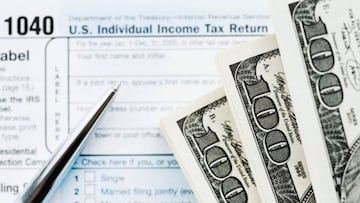What is the limit for filing taxes without paying fines? Deadline and extension information
There are only a few days left for taxpayers to submit their income tax returns. Find out until when it can be done without having to pay fines.

Only a few days are left in the 2024 tax season. The Internal Revenue Service (IRS) has been receiving and processing the declarations corresponding to the 2023 tax year and taxpayers are running out of time to comply with their obligations.
The deadline to file returns and pay taxes, also known as Tax Day, is April 15. Due to the Patriot Day and Emancipation Day holidays, Maine and Massachusetts residents have until April 17 to do so.
Taxpayers who require more time to file their taxes can request a six-month extension until October 15, thus avoiding fines for late filing. This extension can be requested through the IRS Free File tool or by submitting Form 4868 before April 15. The IRS also grants automatic extensions to those who live in federally declared disaster areas.
READ ALSO: Deadlines to keep in mind as tax season comes to an end
If you owe taxes, it's important to file your #IRS tax return by the due date and pay as much as you can. Late-filing penalties are calculated based on the amount owed for each month a tax return is late. See https://t.co/tZ7Ni3lhn3 pic.twitter.com/bWbHGLXkGy
— IRSnews (@IRSnews) April 8, 2024
READ ALSO: Changes to the Supplemental Security Income
Filers must keep in mind that an extension only provides additional time for filing the return, but not for paying taxes. Tax debt is due on April 15 for most taxpayers.
IRS fines and penalties for not filing a return or paying taxes
The fine for not submitting the declaration on time is 5% of the unpaid taxes each month. This penalty begins to accumulate one day after the deadline until it reaches 25% of the taxes owed. If you do not pay your taxes before the due date, the monthly penalty is 0.5% of the unpaid taxes.
If both fines apply- failure to file the tax return and non-payment- 5% of the fine will be the total payment.
If you file your return 60 days after the due date (April 15) or extension date (October 15), there’s a minimum penalty for late filing. It’s the lesser of $485 (for tax returns required to be filed in 2024) or 100% of the tax owed.
The IRS charges interest on penalties. Interest for underpayments is set quarterly, but interest is calculated daily. Nonpayment interest rates for the first quarter of 2024, April through June, are 8% for underpayments.
How to know if you owe a fine
When the IRS imposes a penalty, the tax agency mails a notice or letter to your address. This will give you information about the penalty, the reason for the charge, and what you should do next.
Related stories
Although the recommendation is to file the return and pay taxes as soon as possible, the penalty for not filing the return is much greater than the penalties for non-payment of taxes, so filing is essential.
For more information, visit the penalties section of the IRS website.


Complete your personal details to comment